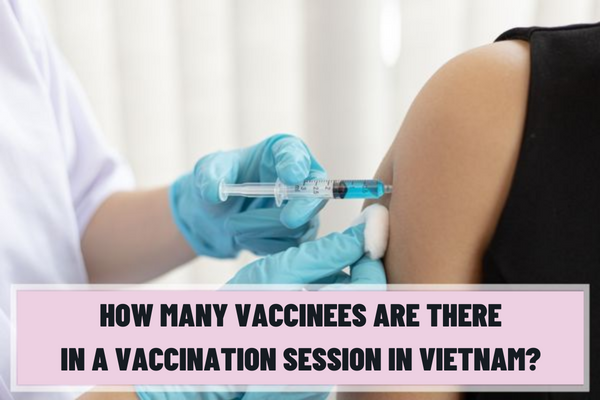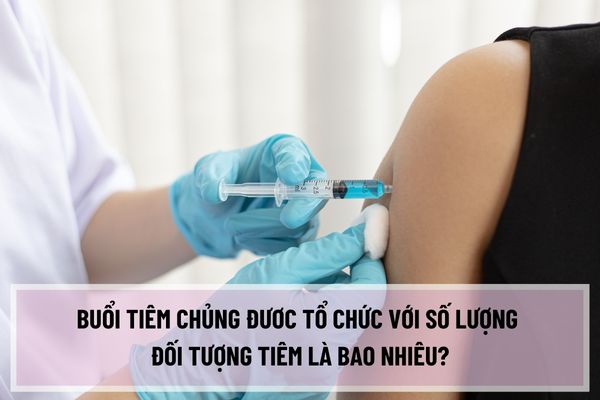How many vaccinees are there in a vaccination session in Vietnam? How long is the time limit for post-vaccination monitoring?
How many vaccinees are there in a vaccination session in Vietnam?
Pursuant to Article 9 of Circular No. 34/2018/TT-BYT stipulating as follows:
Arrangements made at fixed and mobile vaccination clinics
1. There must be no more than 50 vaccinees/vaccination clinic/vaccination session. In the cases where only a single type of vaccine is to be administered during a vaccination session, the number of vaccinees per session must not exceed 100. There must be adequate health workers in charge of performing screening examinations.
2. Each vaccination clinic is entitled to arrange from one to several fixed vaccination clinics and ensure adequate area, personnel, infrastructure and equipment.
3. Each vaccination clinic shall have a table of working arrangements.
4. A vaccination clinic shall be arranged according to a flow pattern: Waiting area → Registration and instruction table → Consultation and screening table → Vaccination table → Vaccination record keeping table → Post-vaccination monitoring and response area.
Thus, the number of vaccinees in the vaccination session is more than 50 vaccinees/vaccination clinic/vaccination session.
In the cases where only a single type of vaccine is to be administered during a vaccination session, the number of vaccinees per session must not exceed 100. There must be adequate health workers in charge of performing screening examinations.

How many vaccinees are there in a vaccination session in Vietnam? How long is the time limit for post-vaccination monitoring? (Image from the Internet)
What should be paid attention to when giving vaccinations in Vietnam?
Pursuant to the provisions of Article 11 of Circular No. 34/2018/TT-BYT stipulating as follows:
Giving vaccinations in Vietnam
1. Dose and administration route of each type of vaccine shall follow the instructions on the label or package insert.
2. Freeze-dried vaccines must be reconstituted as prescribed in the Appendix II hereof.
3. Vaccines shall be used according to the principle: short-dated vaccines must be used first, vaccines received first must be used first or vaccine vial temperature indicator must be used first according to the manufacturer's instructions or vaccines that have not been used up in the previous session must be stored as prescribed and used first.
4. Opened vials of liquid vaccines must be cooled at temperatures between +2 °C and +8 °C and used in a vaccination session.
5. Diluent of one vaccine is only used for such vaccine. Freeze-dried vaccines after reconstitution are only permitted for use within 6 hours or according to the manufacturer’s instructions.
6. Giving vaccination:
a) Check vaccines, diluents, syringes and needles prior to use;
b) Let vaccinees or parents or guardians of children see the vaccine vial before giving vaccination;
c) Give vaccination to the prescribed vaccinees, vaccine, does, administration route and time.
d) Put syringes, needles and sharp objects in a safety box after injection. Do not cover needles.
....
Thus, when giving vaccination, the staff should pay attention to:
- Checking vaccines, diluents, syringes and needles prior to use;
- Letting vaccinees or parents or guardians of children see the vaccine vial before giving vaccination;
- Giving vaccination to the prescribed vaccinees, vaccine, does, administration route and time.
- Putting syringes, needles and sharp objects in a safety box after injection. Do not cover needles.
How long is the time limit for post-vaccination monitoring in Vietnam?
Pursuant to the provisions of Article 12 of Circular No. 34/2018/TT-BYT stipulating as follows:
Post-vaccination monitoring in Vietnam
1. Vaccinees should be monitored at least 30 minutes after vaccination at the vaccination clinic.
2. Instructions provided for vaccinees or their family:
a) Keep monitoring at home at least 24 hours after vaccination in terms of general appearance, mind, eating, sleep, breath, hives and symptoms at the injection site, and inform health workers in case of abnormal signs;
b) Immediately take the vaccinee to a hospital or health facility if one of the following signs occur after the vaccination: high fever (≥39°C), convulsion, child's bursting into loud wails, sniveling and crying for a long time, lethargy, poor feeding, breast refusal, dyspnea, cyanosis, hives and other abnormal signs or common reactions last for more than 24 hours after vaccination.
3. Recording:
a) Write all information in the vaccinees’ vaccination sheet/handbook and enter such information into the National Immunization Information System and make an appointment for the following vaccination session.
b) Enter the date of vaccination for each type of vaccine given to vaccinees and vaccine side effects into the National Immunization Information System.
Thus, vaccinees should be monitored at least 30 minutes after vaccination at the vaccination clinic.
How to provide screening examinations and consultancy before vaccination?
Pursuant to the provisions of Article 10 of Circular No. 34/2018/TT-BYT stipulating as follows:
Provision of screening examinations and consultancy before vaccination
1. Regarding children, conduct screening examinations in accordance with regulations of the Ministry of Health. Regarding adults, observe their general appearance and assess their medical condition.
2. Ask vaccinees and collect their information about medical history, allergies and vaccinations.
3. Provide consultancy for vaccinees, parents or guardians of children on efficacy and benefits of vaccines and explain the possible vaccine side effects.
4. Inform vaccines, parents or guardians of children about efficacy, dose and administration route of vaccines before vaccination.
Thus, the screening examinations and consultancy before vaccination should pay attention to the four issues mentioned above.
LawNet
